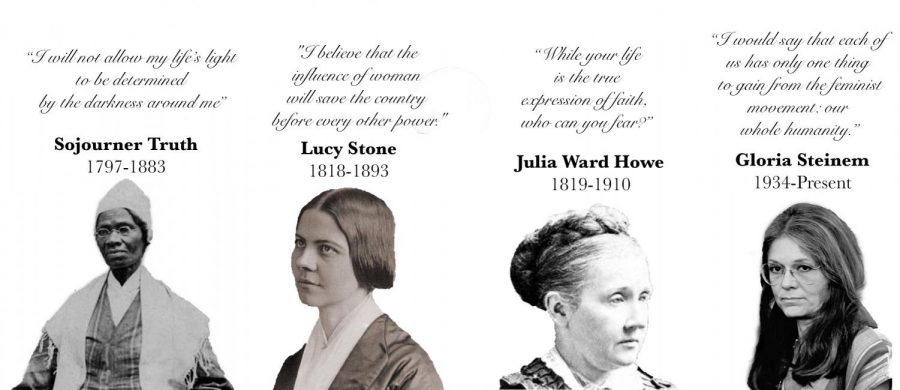International Women’s Day 2019: Our country’s true feminists
I grew up listening to the School House Rock song, “Suffering till’ Suffrage,” on repeat. I was inspired by the bravery and courage of women in the 1900s; the ones who continued to protest, fight, and give up everything they had for the right of women to vote. They were given this privilege with the 19th amendment, the amendment that will allow me to vote in 2020.
I fell in love with the stories of these brave suffragettes: Susan B. Anthony, Elizabeth Cady Stanton, and Alice Paul. They called for the rights of women – something that was well deserved, and something that I’m still fighting for today. These women were my role models and were perfect examples of strong feminists that I strived to be like. So you may ask, what’s the catch? Well, the rights that these women fought for were the rights of white women, white women only.
The Seneca Falls Convention in 1848 was the first women’s rights convention in America. White women all across the country came to the convention, and drafted the “Declaration of Rights and Sentiments,” to argue for women’s suffrage. But black women were not represented; they weren’t even invited.
When African Americans were given the right to vote with the 15th amendment (50 years before women), this angered many of the suffragette leaders. Anthony famously stated, “I will cut off this right arm of mine before I will ask for the ballot for the Negro and not for the woman.” Black people winning the right to vote caused women to push even harder for their voting rights, and, unfortunately, push harder for the exclusion of African American, Native American, and Asian American women.
Although equal rights were their priority, human rights were not. So why do we continue to celebrate and be inspired by these women?
We shouldn’t.
These women were not true feminists since they didn’t support complete equal rights. Instead, let’s celebrate the true feminists, intersectional feminists who support all genders, races, cultures, sexualities, etc. These are the women who should be our role models.
“And ain’t I a woman? I have borne thirteen children and seen most all sold off to slavery, and when I cried out with my mother’s grief, none but Jesus heard me! And ain’t I a woman?”
Intersectional feminism cannot be properly discussed without a shout out to Sojourner Truth. Her “Ain’t I a woman” speech was revolutionary. In 1851, she gathered the courage to speak out against two very accepted things at the time: sexism and racism. It may have taken another 70 years for her words to elicit change, but her courage will never be forgotten.
When the 15th amendment was ratified, suffragettes were rightfully upset over their lack of voting rights, so many outwardly opposed the 15th amendment. This caused a split in the women’s rights movement. Suffragettes who opposed the amendment, such as Anthony and Stanton, went on to protest for white women’s rights, and discriminate against other races.
Suffragettes who supported the amendment, such as Julia Ward Howe and Lucy Stone, went on to create the American Women Suffrage Association. This organization specifically endorsed the 15th amendment and allowed membership from all races and sexes. These feminists were years ahead of their time, and deserve greater recognition for their acceptance and inclusion.
One of the greatest women rights activists of the 20th century, Gloria Steinem, has always been a strong supporter of intersectionality, and even credits much of the feminism movement to black women. In 1972, she created Ms. Magazine, a publication dedicated to informing women – all women – about the women’s rights movement.
Steinem firmly believes that all feminism should be intersectional, and emphasized the importance of intersectionality in an interview, saying, “It reminds us to acknowledge our privilege, and to work towards equality for everyone — rather than a select few at the expense of the rest.”
This is something that we should all remember today. Women like Steinem, Stone, Howe, or Truth are the ones we should remember.
Some credit, however, has to be given to the more well-known suffragettes, such as Anthony and Stanton. Women would not be able to voice their opinion in the government without the efforts of these women in the early 1900s. Their protests, rallies, and hunger strikes greatly influenced the passing of the 19th amendment in 1920. But their success should never cover the true racism that’s hidden behind their call for “equal rights”.
This Friday, March 8th, is International Women’s Day. While you’re rocking a Rosie the Riveter shirt and jamming to Beyonce on repeat, keep in mind what this day is really celebrating: women that supported equal rights for everyone, and the women today that continue to uphold and teach these values.
If it isn’t intersectional, it isn’t feminism.
Your donation will support the student journalists of Highlands High School. Your contribution will allow us to cover our annual website hosting costs.



